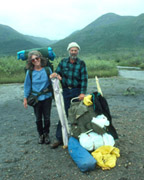Ranger Overboard
©Bert Gildart: Janie says she saw it all: One moment the ranger leading our group through a red mangrove swamp in canoes in Big Cypress Swamp National Preserve was perfectly upright; and her only mistake may have been that she turned to address the group—causing the canoe to cant.

RANGER OVERBOARD: At that precise moment, bad luck struck in the form of a powerful wind gust that lifted the bow of her canoe and canted it much, much further than her motion had. In short, both Ranger Nereida Ramos and her paddling partner dumped, and were soon standing up to their armpits in the very same swamp water in which we’d seen alligators swimming just moments ago.
“Just bad luck,” said Janie, “and I’m just glad we weren’t moving around when the wind blew.”
But we now had a dilemma, and though Nereida didn’t seem concerned, the thought crossed my mind—and that of others in our group—that just moments ago, we’d passed several alligators. Now, all we wanted was to see the two women back safely in the canoe.
We were closest to the overturned canoe, and so we pulled in next to Nereida; and with the now-swamped canoe upside down and the bow of her canoe on the bow of ours, both Nereida and her companion lifted their canoe’s stern. Water quickly thudded out, and then the two spun the canoe so that it was now once again right-side up. Then it was a matter of stabilizing the canoe so the women could clamor back in, all accomplished with several others in the group. Both women were good sports about the entire incident, and during the procedure Nereida had even shouted out, “Well where’s the photographer now?”

ALLIGATOR INCIDENTS RARE: Apparently the alligators were forgotten, and the fact of the matter is that several rangers I queried said they could remember but one incident in which there had been an alligator attack on a human, and that, interestingly enough, occurred just last year.
The incident happened in Everglades National Park, not Big Cypress, and it occurred in Shark Valley, just a short distance from where we’re camped at Midway Campground. At the time, a young boy and his parents had been riding the tram on the 15-mile long loop and somehow the young boy had slipped—and as I understand the story—had slipped right near an alligator that had been sunning itself.
Immediately the alligator grabbed the boy and began pulling him toward the water’s edge. Apparently the parents beat on the alligator, and, uncharacteristically, the reptile released the boy, who suffered injuries but apparently nothing that would later handicap him.

RED MANGOVE SWAMP: Despite freak accidents swamps really are fascinating places to visit, and during our time here in Big Cypress, we’ve tried to take in all the activities this preserve offers. One such trip was, of course, the canoe paddle through a red mangrove swamp, which everyone continued to enjoy, even after Nereid’s mishap, and which she continued to make almost as interesting as her mishap.

NIGHT HERONS: Nereida understood the flora and fauna and pointed to what she thought was a Black-crowned Night Heron, but was too far away to confirm. The other night heron, the Yellow-crowned Night Heron, is one I’ve described in previous entries, and is just one of the many aspects I’ve learned about while engaged in other Big Cypress activities.

SWAMP WALK: Other adventures in Big Cypress area took place for us just two days ago while on another ranger led activity known as the “Swamp Walk.”
Corinne Fenner conducted the program, and despite what many might believe, the walk is one of the park’s more popular activities. The purpose was, in part, to interpret a hammock, and those in attendance included two campground volunteers, an artist, and a retired teacher, among others. What we all apparently shared in common was an interest in adventure and in learning more about Florida’s natural history.
Florida is essentially flat, with a peak elevation of about 345 feet. Just one or two feet can make all the difference in vegetation, and that, in part, is what the ranger’s hike pointed out. Connie said that hammocks are mounds of dry land that support a variety of tropical and temperate life in combinations unique to each.

BROMELIADS: Because of their higher elevation, hammocks host a variety of forms of vegetation such as the cypress tress. In turn cypress trees, and the somewhat watery environment in which they occur, support a variety of unusual plants called epiphytes. This group derives all nourishment from the air and rain water and from little else, and includes a family of bromeliads, one of the colorful plants shown here.
Big Cypress is indeed a diverse park, established essentially to help further protect Everglades National Park. The contiguous preserve was created in 1974, but has become an attraction in itself, certainly easy to understand with rangers willing to wade swamp waters to promote interest.
And now we have a ranger apparently willing to dump her canoe, something we’ll expect to see again when we return, for we suspect it was all just part of the program.


May 15th, 2009 at 11:50 am
Great website and interesting blog post – will come back again for another look soon.
May 16th, 2009 at 11:22 am
“Canoe’s” posting was probably computer generated, and normally I don’t allow such responses. However, some of the outdoor firms “Canoe” represents support the Outdoor Writer’s Association of America, an organization to which I belong. What’s more, if you are interested in seeing what’s available they’re worth checking out.